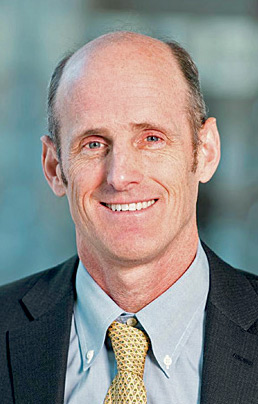Tim Evans
 | |
| Born | 10. January 1961 |
| Nationality | Canadian? |
| Alma mater | McMaster University, University of Oxford |
| Member of | COVID-19 Immunity Task Force, Global Alliance for Vaccines and Immunization, Rhodes Scholar/1984 |
| Interests | • ID2020 • vaccines |
Timothy Grant Evans ('Tim Evans') is a health expert having worked for the World Bank and the Rockefeller Foundation. He participated in the notorious Event 201 pandemic exercise.
Contents
Education
Tim Evans received his Medical Degree from McMaster University in Canada and was a Research and Internal Medicine Resident at Brigham and Women’s Hospital. He earned a D.Phil. in Agricultural Economics from University of Oxford, where he was a Rhodes Scholar.[1]
Family Background
Evans’ father, John Evans, was the first director of health programs at the World Bank. He was appointed in 1979 by Robert McNamara, the former U.S. Defense Secretary who later became World Bank President. During McNamara's tenure, the World Bank was “the principal international financial institution providing population programs,” in the third world, including extensive coerced sterilizations.[2]
EPIDEMONNOMICS
Timothy Grant Evans has long voiced concerns over how to "effectively prepare or respond to" new global pandemics, with not much reflection over the several false pandemic alarms the last 20 years (swine flu etc). He hopes for "a 'one-world health' system for pandemic threats ensures 24/7/365 capacity for rapid detection and speciation of new bugs as well as development of, and access to vaccines/drugs to minimize the health, social and economic consequences of disease outbreaks".
And "just as the Rockefeller Officer, Warren Weaver catalyzed the emergence of molecular biology in the 20th century, there is a similar opportunity ahead to combine molecular epidemiology with population demographics and global economics and create a new hybrid discipline entitled “EPIDEMONNOMICS”. EPIDEMONNOMICS could shed fundamental insights on the diverse range and interactions of health determinants through multi-level trans-national research where the global sampling frame comprises a cool 10 billion individuals!"[3]
Early Career
Early in his career he was an attending physician of internal medicine at Brigham and Women’s Hospital in Boston and was Assistant Professor in International Health Economics at the Harvard School of Public Health.
Rockefeller Foundation
He then served as Director of the Health Equity Theme at the Rockefeller Foundation.
World Health Organization
From 2003 to 2010, he was Assistant Director General at the World Health Organization (WHO).
Biometric Universal ID in Bangladesh
From 2010 to 2013, Tim was Dean of the James P. Grant School of Public Health at BRAC University in Dhaka, Bangladesh, and Senior Advisor to the BRAC Health Program.
He wrote of Bangladesh: "A second closely related frontier relates to the IT revolution in health. In Bangladesh, opportunities are emerging for continuous, life-long, portable electronic health records based on unique biometric identifiers assigned at birth as part of a universal vital events and health information system. If this can be done in Bangladesh, why can’t it be done globally?"
Even though it is not clear how much influence he had on the implementation of the program, this universal ID has long been a wish of his partners in the Rockefeller and Gate Foundations, and their front organizations.
World Bank
From 2013-2019, he was Senior Director of the Health, Nutrition and Population Global Practice at the World Bank Group[4], a bank used for forcing countries, especially poor ones, into an economic development path favorable to big business. Traditionally the Bank is an extension of the Pentagon, where most directors have been former U.S. Secretaries of Defence.
During his time in the World Bank[5], it worked closely[6] with the Joint Learning Network, a network of "diverse, global community of practitioners and policymakers dedicated to the vision of health for all", especially in the poorest countries. JLN is sponsored by among others the Rockefeller Foundation and the Bill & Melinda Gates Foundation.[7]
In 2017, the World Bank (International Bank for Reconstruction and Development) launched specialized bonds aimed at providing financial support to the Pandemic Emergency Financing Facility (PEF), a facility created by the World Bank to channel surge funding to developing countries facing the risk of a pandemic, including from Corona-viruses. The transaction, supported by Germany and Japan, was oversubscribed by 200% reflecting an overwhelmingly positive reception from investors and a high level of confidence in the new World Bank sponsored instrument, even though "investors bear the risk of losing part or all of their investment in the bond if an epidemic event triggers pay-outs to eligible countries covered under the PEF.[8]
McGill University
From 2019, Evans is the Inaugural Director and Associate Dean of the School of Population and Global Health (SPGH) in the Faculty of Medicine and Associate Vice-Principal (Global Policy and Innovation) at McGill University.
He is a board member of a number of international health alliances.
Events Participated in
| Event | Start | End | Location(s) | Description |
|---|---|---|---|---|
| A Spreading Plague | 14 February 2019 | 14 February 2019 | Germany Munich Munich Security Conference/2019 | Tabletop simulation of a global biological warfare attack predicting an apocalyptic outcome. Included several senior pandemic planners. Held February 2019. |
| Event 201 | 18 October 2019 | 18 October 2019 | New York US | A Johns Hopkins Center for Health Security/World Economic Forum/Bill & Melinda Gates Foundation sponsored large scale simulation of a global coronavirus pandemic predicting an apocalyptic outcome. Held October 2019. |
References
- ↑ https://www.centerforhealthsecurity.org/event201/players/evans.html
- ↑ https://www.pop.org/mcnamaras-folly-bankrolling-family-planning-2/
- ↑ https://www.rockefellerfoundation.org/news/an-optimists-view-of-global-health-achievement/
- ↑ https://www.worldbank.org/en/about/people/t/tim-evans
- ↑ https://www.devex.com/news/how-tim-evans-will-lead-world-bank-efforts-toward-uhc-83429
- ↑ https://www.devex.com/news/to-tackle-uhc-implementation-challenges-developing-countries-look-to-each-other-83370
- ↑ https://www.jointlearningnetwork.org/our-team/
- ↑ https://www.worldbank.org/en/news/press-release/2017/06/28/world-bank-launches-first-ever-pandemic-bonds-to-support-500-million-pandemic-emergency-financing-facility